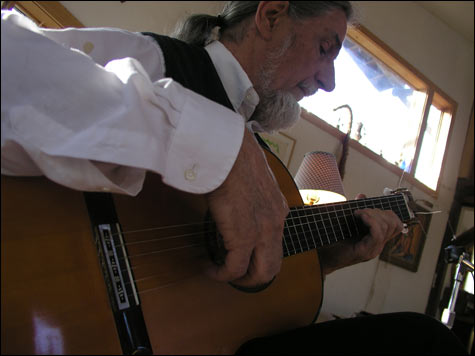
STRING THEORY: Walker believes that flamenco acts as a kind of “missing link” between Eastern and Western music. |
“A lot of people wonder what they’re going to do in life, what it’s all about for them,” says guitarist Peter Walker. “But I don’t have any angst. I’m very busy doing what’s obviously right in front of me.” As we begin our conversation, Walker offers a pre-emptive apology. He arrived home in Woodstock, New York, only the night before after a three-week trip to Peru, and he fears he’s still a little groggy. His focus returns, however, when the subject turns to one of his great passions, one that took him to Peru and has drawn him to Spain countless times in the past: flamenco.
A former student of Ravi Shankar and Ali Akbar Khan, Walker — who comes to the Nave Gallery this Sunday — is a legendary figure best known for his intoxicating fusion of Indian raga and American folk. (It’s captured most powerfully on his 1967 Vanguard album Rainy Day Raga.) But his first love is the Gypsy music of Spain. “As a young child, I saw a movie with flamenco in it called Ship of Fools, and the music struck a chord with me. My father played guitar, so I was already programmed genetically to be a player, and that’s what I wanted to do from then on.”

The challenge for Walker, who was born in Medford (not exactly a hub of Spanish musical culture), was finding people to instruct him in the art of flamenco. He studied with a variety of teachers who passed through Boston; at the same time he was developing formidable chops as a folk player. By the time he made his first trip to Spain, in 1963, he was already well established in the coffeehouses of Cambridge and the basket houses of New York.
“It was an interesting scene,” he says of his time in New York. He describes going through a set of strings a day in marathon practice sessions with the likes of John Sebastian and José Feliciano followed by concerts that went into the wee hours of the morning. During that period, he supported just about every major act that came through New York, from Muddy Waters to the Mothers of Invention.
His most illustrious opening gig, however, was his stint as music director for Timothy Leary’s famed Happenings. His role was to get the audience in the proper frame of mind for psychedelic enlightenment. By that time, Walker had immersed himself in the study of Indian music. To get a taste of what the music was like at the Happenings, you need only listen to Rainy Day Raga.
After the 1969 release of his flamenco-tinged second album, Second Poem for Karmela, Walker faded from the scene, only to be rediscovered by Josh Rosenthal of the Tompkins Square label a few years ago. In the intervening decades, which he laughs off as “my lost years,” he intensified his study of flamenco, working with master teachers, playing in bands in Seville, and eventually participating in the close-knit family circles in the caves above Granada.
His first album of flamenco-inspired music, Echo of My Soul, has just been released by Tompkins Square, but it’s not a complete break from his earlier work. Walker has decided, after careful study, that raga and flamenco are intimately related, with flamenco acting as a kind of “missing link” between Eastern and Western music.
His performance on Sunday will find folkloric Americana mingling with the far-flung sounds of India and Spain — but it’ll still feel like home. “I’m looking forward to playing in Somerville. I’m from Medford, so it’ll be kind of like playing for my father.”
PETER WALKER | Nave Gallery, 155 Powderhouse Blvd, Somerville | July 13 at 7:30 | $10 | www.artsomerville.org